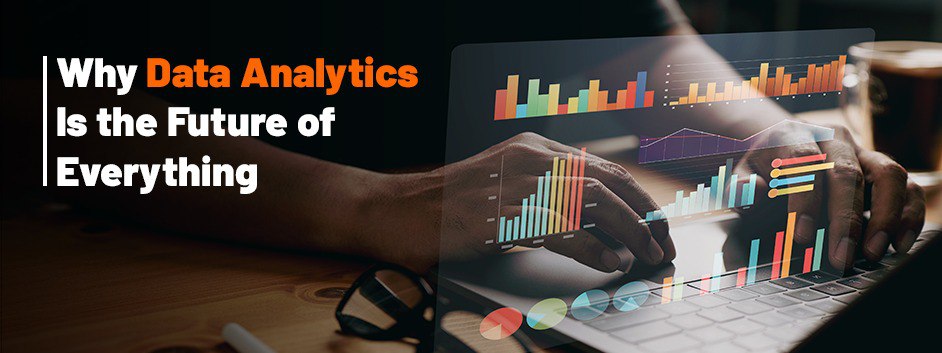Data analytics examines raw data to conclude, make predictions, and drive informed decision-making. It converts raw data into actionable intuition. Data analytics is expected to expand rapidly in the upcoming decade and beyond. It is considered to be the future of everything.
Table Of Contents
Types Of Data Analytics
Importance Of Data Analytics
Why Data Analytics Is the Future of Everything
Fostering Data-Driven Decision-Making
Driving Innovation
Utilizing the Power of Big Data
Artificial Intelligence and Machine Learning
Risk Management
Data Analytics: A Good Career Choice
Conclusion
FAQS
Types Of Data Analytics
Data analytics uses raw data to detect trends and draw conclusions from large batches of data. There are 4 types of data analytics they are:-
- Descriptive Analytics
Descriptive analytics examines historical data to identify relationships and patterns. Data analysts compare past results, identify anomalies, and distinguish strengths and weaknesses. They utilize machine learning to spot patterns and connections in data.
- Diagnostic Analytics
Diagnostic analytics examines historical data to diagnose the root cause or problem. It aims to answer “Why did this happen?” from data summarization. Diagnostic analytics can be done with data mining, discovery, drill-down, and correlation techniques.
- Predictive Analytics
Predictive Analytics examines historical or current data to predict future actions. Predictive analytics combines past data with machine learning, data mining techniques, and statistical modeling. It helps to understand the possible impact of problems.
- Prescriptive Analytics
Prescriptive Analytics examines descriptive, diagnostic, and predictive analytics results and identifies the best steps to take in any given scenario. It works to find the best possible solution and ensure good potential outcomes.
Importance Of Data Analytics
Data analytics has been widely used by several sectors such as healthcare, travel, retail, and hospitality.
- Implementing data analytics in business helps to decide who your customers are, determine how to reach your customers, and determine competitors. The companies enhance the decision-making process.
- Implementing data analytics in healthcare helps to make better care decisions for patients, improve patient’s lives, and maximize the efficiency of health systems.
- Using data analytics in the travel industry ensures data-driven decisions that eventually enhance revenue, mitigate risk, and increase efficiencies.
- Implementing data analytics in the hospitality industry improves the customer experience and navigates profitability by accurately forecasting demand.
Why Data Analytics Is the Future of Everything
By 2030, the Bureau of Labor Statistics (BLS) predicts a 22% increase in data analysts, which is much faster than average. Here are the reasons why data analytics is the future of everything.
Fostering Data-Driven Decision-Making
The data-driven decision-making process uses data and facts to guide and support the decision-making process. It encourages organizations to collect, analyze, and interpret data to guide strategic business decisions that align with their goals and objectives. Rather than relying on assumptions, a decision is made based on facts.
Driving Innovation
Driving innovation means thinking of new ideas or implementing them differently. It is a powerful tool for staying ahead of the competition, improving customer understanding, and creating new growth opportunities. Driving innovation within an organization can be challenging. By discovering hidden patterns, trends, and insights within a large set of data, data analytics assist in innovation.
Utilizing the Power of Big Data
Big data is the process of extracting, organizing, and analyzing the information collected from your customers, industry, and market trends. Big data has a greater importance in an organization. It helps to enhance decision-making, provides better customer and market insights, and encourages cost savings. Big data analytics discover the trends, patterns, and correlations in large amounts of raw data to make data-informed decisions.
Artificial Intelligence and Machine Learning
Artificial Intelligence and Machine Learning have been important tools for data science optimization. It improves data analytics workflow. By integrating AI and ML you can make predictions in real-time without human involvement. They could work with far more data than humans ever could alone.
Risk Management
Risk management protects the organization from negative risks and increases growth opportunities. Analyzing a large amount of data, helps a business to optimize its performance, perform more efficiently, maximize profit, and drive informed decision-making. You can evaluate the outcomes of previous risk management actions and analyze areas for improvement.
Data Analytics: A Good Career Choice
Data analytics is a fast-growing field. Online data is expected to grow with no signs of slackening. Data analytics is important for every industry. There is a shortage of people with excellent data analytics skills, companies often need help finding professionals in data analytics. Hence data analysts have great job opportunities and make a good salary.
It is estimated that more than 3,000 positions will need to be filled annually by 2030. Being a Data analyst helps to develop more transferable skills that you can use in other positions. If you are a keen problem-solver with an analytical mindset and a logical approach to work then data analytics is a good career choice.
Conclusion
Data Analytics analyzes a large volume of data to find trends and solve problems. Data analytics is important in today's world. It is being used in every industry as it helps to stay ahead of the competition so consider the future of everything.
FAQS
Which institution is best for an MBA in Data Analytics?
Presidential Graduate School, previously known as Presidential Business School located in Thapagaun, New Baneshwor, Kathmandu is the best institution for an MBA in data analytics.
Why is data analytics the future?
Due to growing attention to data-based decision-making by companies and organizations, data analytics is the future of everything.
What is the future of data analytics?
Data analysts are in high demand. It is estimated that more than 3,000 positions will need to be filled annually by 2030.

